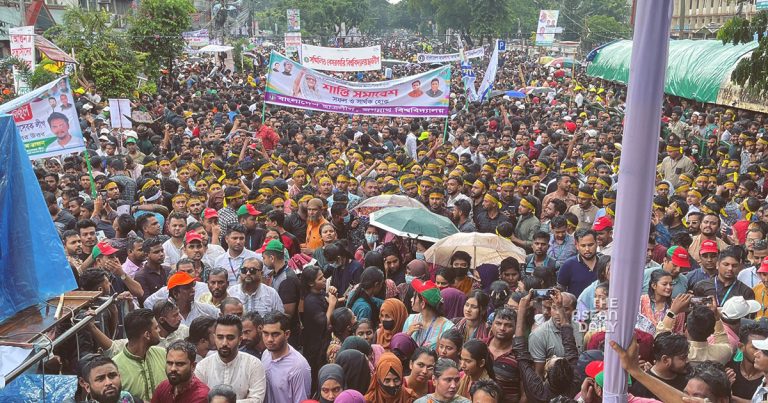29-7-2023 (DHAKA) Rubber bullets and tear gas were employed by Bangladesh police on Saturday (Jul 29) to disperse stone-throwing crowds that had blockaded major roads in the capital city, Dhaka. The protest, organized by the opposition Bangladesh Nationalist Party (BNP) and its allies, adds to a series of demonstrations over the past year demanding the resignation of Prime Minister Sheikh Hasina. Protesters are urging her to make way for a caretaker government to oversee the upcoming elections scheduled for January.
Clashes between police and thousands of protesters erupted in various locations around Dhaka as the authorities moved in to clear the blockades and restore traffic flow on key arterial roads. Dhaka Metropolitan Police spokesman, Faruq Ahmed, informed AFP that some officers were injured during the operations, leading to the use of tear gas and rubber bullets.
One of the protest sites in Dholaikhal, once an old neighborhood but now a hub for automotive repair shops, saw AFP journalists witnessing protesters retaliating by throwing rocks at riot police and their vehicles. The clashes resulted in six protesters being admitted to Dhaka Medical College Hospital with injuries, according to Police Inspector Bacchu Mia.
Amidst the protests, senior BNP leaders Goyeshwar Roy and Amanullah Aman were taken into police custody, but they had not been formally arrested, Ahmed revealed.
The demonstrations have severely disrupted transport links between Dhaka and other parts of the country, with trucks and buses stuck in gridlock due to the ongoing protests.
The ruling Awami League, led by Prime Minister Sheikh Hasina, has been in power in Bangladesh since 2009. However, it has faced accusations of human rights abuses, corruption, and a drift towards authoritarianism. The BNP-led protests have gained momentum in recent times, with this month’s rallies drawing tens of thousands of participants to the streets.
Prior to a rally outside the BNP headquarters this week, police arrested at least 500 opposition activists.
The political climate in Bangladesh has raised concerns among Western governments, particularly due to the ruling party’s dominance in the legislature, effectively operating as a rubber stamp.
Furthermore, security forces under Prime Minister Hasina’s leadership have faced allegations of detaining tens of thousands of opposition activists, with hundreds reportedly killed in extrajudicial encounters, and many leaders and supporters allegedly disappeared. In response to these alleged human rights abuses, Washington imposed sanctions on the elite Rapid Action Battalion (RAB) security force and seven of its senior officers in 2021.
Meanwhile, Khaleda Zia, the leader of the BNP and a two-time former prime minister, remains under house arrest following her conviction on graft charges, making her a prominent figure in the ongoing protests.
Gayeshwar Chandra Roy,
a member of the main opposition #BNP‘s standing committee, was attacked and taken into custody by the #BDPolice during a peaceful protest demanding #SheikhHasina‘s resignation in #Dhaka.#Bangladesh pic.twitter.com/f5USQ7e3xo— Public Press BD (@bd_public) July 29, 2023




